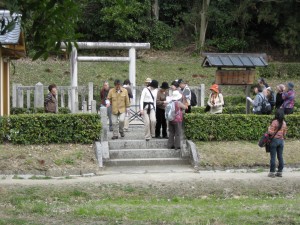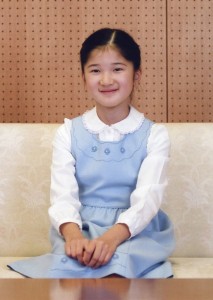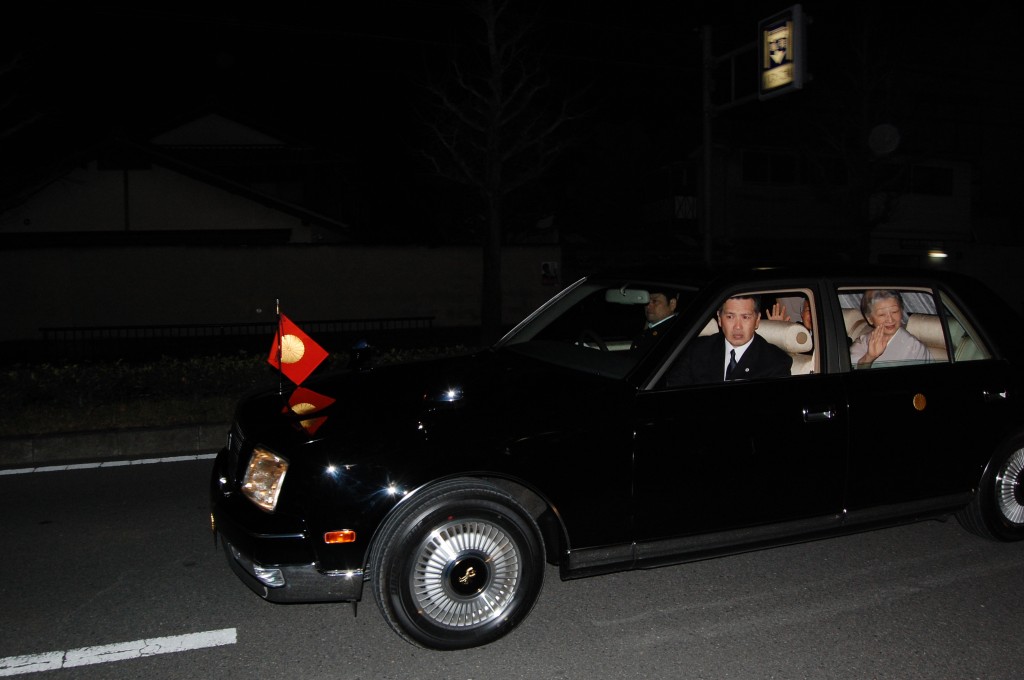The peculiarities of the Imperial Household Law are highlighted in the article below, which explains the latest developments concerning the lack of males in the emperor’s family. The present laws are nothing to do with antiquity, but were drawn up after the Meiji Constitution and amended thereafter. With the heir to the throne only having a single female child, there had been discussions about what should happen to secure a male successor despite the historical precedent for reigning empresses. Discussion stopped once the younger brother of the heir produced a son. Yet bizarrely, the present Constitution guarantees equality under the law.

Hashihaka grave near Sakurai in Nara prefecture, possible burial site of the third-century Empress Himiko
What’s all this got to do with Shinto, one might ask? Well, it has little to do with groundroots activities, but the emperor is viewed as head priest of the religion as a whole because he is descended from Amaterasu, the sun goddess. The country’s premier Shinto shrine at Ise enshrines the imperial family’s ancestral spirit. “Shinto’s ideal form of state is one in which the emperor reigns while all kami, with Amaterasu at the center, are the object of ritual and worship,” states the Kokugakuin Encyclopedia of Shinto.
Although the emperor renounced his divinity at the end of WW2, he is still referred to as the 125th in line from Amaterasu and at his enthronement participates in a religious rite called the daijosai in which he communes with her spirit.
Given the rediscovery of the Goddess principle in the West, and the greater awareness in recent times of the role of the miko (female medium) in ancient Japan, one might have thought that if the imperial system was going to be retained, the time was long overdue for the return of a reigning empress. Himiko is dead; long live Himiko!
**********************************************************************
Friday, Oct. 5, 2012 Japan Times
New concept of Imperial female branches mulled
Kyodo
The government proposed on Friday enabling female members of the Imperial family to establish their own Imperial branches after marriage to commoners, amid concern over the falling number of royal household members. The establishment of female Imperial branches “should be considered” only for daughters and granddaughters of emperors, the government proposal says.
The Imperial Household Law requires female members of the Imperial family to relinquish their Imperial status after marriage to commoners. Among the 21 Imperial family members under Emperor Akihito are eight unmarried females, including Princess Aiko, 10, the daughter of Crown Prince Naruhito and Crown Princess Masako, and Prince Akishino’s two daughters, Princess Mako, 20, and Princess Kako, 17. The three princesses would be subject to the new system if it is created.

Princess Aiko, reportedly bullied at school, may have cause to smile at the prospect of starting her own branch of the imperial family (REUTERS/Imperial Household Agency of Japan)
The proposal, which clarifies points for upcoming discussions concerning the status of female Imperial family members, also lists both ideas to give and not to give Imperial status to the husband and children of a princess who establishes her own Imperial branch. It says the idea of retaining the title of princess after marriage to allow them to engage in Imperial activities “would be difficult to implement” in light of the Constitution, which guarantees equality under the law.
The proposal mentions an idea to give such female Imperial family members status as national public servants to remain involved in royal activities. In creating a new system, the proposal says the government would make sure that opinions of the female Imperial family members will be reflected and that the system would not be an obstacle for their marriage.
The government will take public comments on the proposal over a period of about two months with the aim of mapping out a draft amendment to the Imperial Household Law and submitting it to the Diet next year, Chief Cabinet Secretary Osamu Fujimura said. The matter has come into focus due to concern the Imperial family may not be able to maintain its activities in a stable manner given the large number of female compared with male members.
The proposal drew positive responses from the Imperial Household Agency. An agency official said it was “significant” that the government listed the points of discussion as a way to deal with the decreasing number of Imperial members. Another official expressed hope that discussions over the matter “would move forward” after the government gathers opinions from the public.
But some other officials pointed to the uncertain outlook over creation of the new system. “It may be difficult to decide on one direction concerning the Imperial Household Law as there are a variety of opinions,” one said.

The present wife of the emperor, Empress Michiko, on a visit to Kyoto. She was from a Catholic family and became the first commoner in history to marry into the imperial family (prior to that Mishima apparently considered marrying her.)

Sorry to say that, but you misunderstand three important facts.
First, it’s true the japanese Emperor claim descent from Amaterasu Omikami, a female goddess. But technically, the lineage was founded by Ninigi-no-Mikoto, her grandson. They use Amaterasu as their main Ujigami because it’s her who is the strongest shinto kami and because the Heavenly Mandate of Ninigi and Jimmu-Tennô came from Amaterasu Omikami.
Second point, reigning Empress became a taboo a verry long time ago, because of the choice of husband. History said a monk who performed miracles to gain a reigning Empress’ favors tried to become Tennô and marying her. He almost succeded, only loyal and diligent courtiers and shinto priest managed to save the Throne from this traitorious heresy. It is only in Japan that servants and nobility never actually tried to overthrown their Monarch’s Dynasty and the lineage remained unbroken. Fujiwara clan, Taira clan, Minamoto clan, Ashikaga clan, Tokugawa clan… all found their pride in their ancestors service and loyalty to the Imperial Family, and thus they only sent daughters to wed Princes, Emperors and court nobles.
And Third, it’s not a reigning Empress the problem. It’s the Chromosome Y wich only males possess and who was passed down in the lineage since Ninigi-no-Mikoto. Aside from those reigning Empress, all japanese Emperors had this. But if an Empress acess the Throne nowadays, this lineage will vanished. Consider it a serious issue, because regardless mainstream opinions, traditions this old wich are not directly malevolent or something (like would be human sacrifice or female mutilation of the clitoris in Africa, for exemple) need to be preserved. Because we don’t know enough to say they don’t deserves it. The fact it may have survive this long is marvelous, don’t you see ? A World Record only need one thing, and that is to be further extended.
Plus, japanese Governement said it too : “It’s just the Imperial Family’s Nature.” ;)
Shinto is amazing as described in ,
http://listverse.com/2013/11/28/10-things-you-should-know-about-shinto/
Japanese people are very nice too. I wonder if there is a connection woth the lovely Shinto reverence of nature
Thank you for the link, which is concise but interesting in various ways. As for the connection with the Shinto reverence of nature, there certainly used to be in Japan’s traditional lifestyle, but since the age of Westernisation there’s very little in Japanese society as a whole that speaks of harmony with nature – quite the opposite, as anyone who has read Alex Kerr’s ‘Dogs and Demons’ will know. However, in certain traditional crafts and occupations, the old reverence for animism still remains.